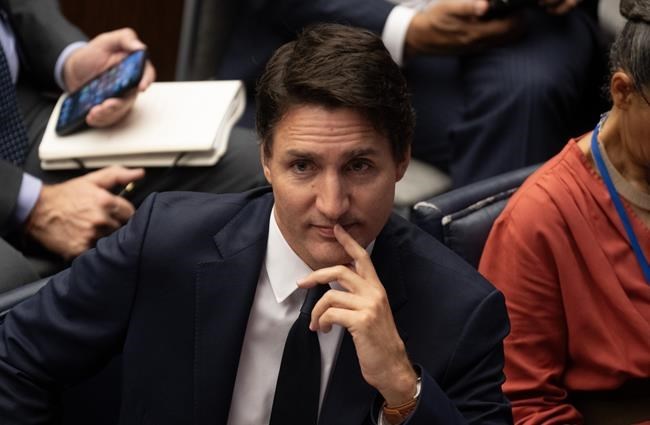NEW YORK — Ukraine and the climate crisis battled for top billing Wednesday at the UN General Assembly, where Canada struggled to reconcile its reputation as an oil and gas supplier with the global effort to cool the planet.
During the Climate Ambition Summit, a gathering aimed at holding 30 invited countries to account for their efforts so far, Prime Minister Justin Trudeau offered only a glimmer of optimism.
Canada is on track to hit, and potentially even surpass, its target of a 75 per cent reduction in oilpatch methane emissions from 2012 levels by the end of the decade, he told the group.
Canada "was one the largest expanders" of fossil fuel production last year, the UN moderator noted — a detail Trudeau acknowledged only obliquely, with a hint of domestic politics thrown in.
"In 2015, Canada — a major oil and gas supplier — was far behind on climate action," he acknowledged, without saying out loud that 2015 was the year his Liberals took office.
"With hard work, we've been able to change that. Canada's emissions are, in fact, trending down."
At home, climate stakeholders were unmoved.
Trudeau "arrived with more promises, but not much action," said Greenpeace Canada climate spokesperson Salomé Salé, noting the absence of any limits on fossil fuel production.
"The government must stop delaying action and make fossil fuel companies pay for the cost of catastrophic climate impacts they are responsible for."
Barbados Prime Minister Mia Mottley, one of Trudeau's close allies, pleaded with leaders to give the climate crisis the same attention as the assembly's other dominant theme: the war in Ukraine.
"I hope that in the same way we can take Ukraine seriously in the Security Council, we can take the climate crisis seriously," Mottley said.
"This is as much a threat — in fact it is a greater threat because more lives are at stake globally than are at stake in Ukraine."
But Ukrainian President Volodymyr Zelenskyy, who seems to pull focus just about everywhere he goes, did just that earlier Wednesday when he spoke to a high-profile meeting of the UN Security Council.
Clad in his familiar olive-green fatigues, Zelenskyy called Russia's invasion a "criminal and unprovoked aggression" and the country a "terrorist state" bent on destroying not only Ukraine, but the multilateral guardrails put in place after the Second World War to prevent global conflict.
And he called on the UN to give General Assembly members the power to strip permanent Security Council members of their veto, which Russia has been using to block the body's efforts to take action.
"We must all stand up to this affront to the UN," Trudeau said when he addressed the council later in the day.
"We must not let the world return to a place where might makes right. We must make sure that borders mean something, even when a neighbour has a bigger army."
He accused Russian President Vladimir Putin of "weaponizing" energy and food, denying resources to millions, particularly in the Global South, a part of the world dependent on food exports from central Europe.
And he brought the conflict in Ukraine full circle, back to the UN effort to implement the 17 sustainable development goals, a mission the body launched back in 2012.
"We do not believe we have to choose between supporting Ukraine and supporting the SDGs and global development," Trudeau said.
"The only responsible choice is to do both, which we are doing with solidarity and financial commitment."
Ukraine, global action on climate and resurrecting the lagging SDG project had promised to be the dominant themes of Trudeau's time in New York, and Wednesday's agenda bore that out.
Environment Minister Steven Guilbeault even tossed in a healthy dose of domestic partisanship for good measure.
Canada was only invited to participate in Wednesday's climate summit because of the effort it has made to date in taking its environmental obligations seriously, Guilbeault said.
"I think if you were to ask the question, 'Would Canada have been invited here 10 years ago under a Stephen Harper government?' the answer is obviously no," he said.
"Pierre Poilievre doesn't believe — and the Conservative Party of Canada doesn't believe — that climate change is an issue that's worth paying any attention to."
The progress on methane, Guilbeault said, is especially noteworthy.
"It's a very powerful greenhouse gas, but if collectively we can work to reduce methane emission, we can shave off almost 1 C of temperature increase in the coming decades. This is massive."
Guilbeault demurred, however, on whether Canada's message to the UN is that it's possible to be both a major oil and gas producer as well as a leader on reducing emissions.
"We are moving into a carbon-constrained world," he said.
"We will need less fossil fuels than we need now, and … we need to ensure that this energy transition is done in a way that is just and that is fair for workers."
Trudeau also told the summit that Canada would allocate US$700 million more — C$1.3 billion — to the Poverty Reduction and Growth Trust, a fund to help developing countries deal with climate change.
"If we walk away from this fight, as some would have us do, the future will not be bright," he said. "But if we do keep taking action, things will get better. Our shared future will be stronger."
This report by The Canadian Press was first published Sept. 20, 2023.
James McCarten, The Canadian Press



